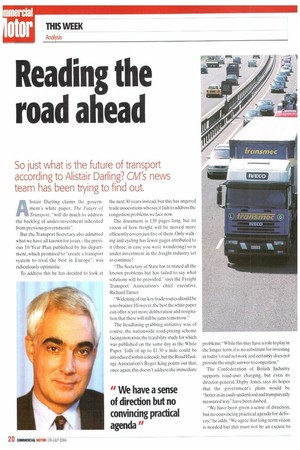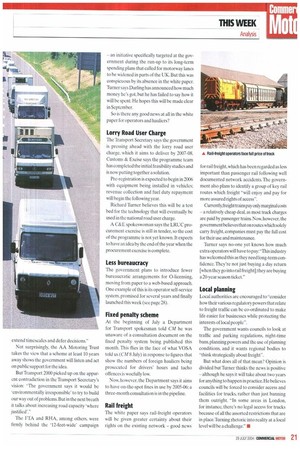Reading the road ahead
Page 20

Page 21

If you've noticed an error in this article please click here to report it so we can fix it.
So just what is the future of transport according to Alistair Darling? CM'S news team has been trying to find out.
Alistair Darling claims the government's white paper, The Future of Transport, -will do much to address the backlog of under-investment inherited from previous governments-.
But the Transport Secretary also admitted what we have all known for years the previous 10-Year Plan published by his department, which promised to "create a transport system to rival the best in Europe", was ridiculously optimistic.
To address this he has decided to look at the next 30 years instead, but this has angered trade associations who say it fails to address the congestion problems we face now.
The document is 139 pages long, but its vision of how freight will be moved more efficiently covers just five of them. Only walking and cycling has fewer pages attributed to it (three, in case you were wondering) so is under-investment in the freight industry set to continue?
"The Secretary of State has re-stated all the known problems but has failed to say what solutions will be provided," says the Freight Transport Association's chief executive. RichardTumer.
"Widening of our key trade routes should be no-brainer.However,the hest the white paper can offer is yet more deliberation and resignation that there will still be jams tomorrow."
The headlining-grabbing initiative was, of course, the nationwide road-pricing scheme facing motorists, the feasibility study for which was published on the same day as the White Paper. Tolls of up to £1.30 a mile could be introduced within a decade,but the Road Haulage Association's Roger King points out that. once again, this doesn't address the immediate problems:"While this may have a role to play in the longer term, it is no substitute for investing in today's road network and certainly does not provide the single answer to congestion."
The Confederation of British Industry supports road-user charging, but even its director-general, Digby Jones, says its hopes that the government's plans would be "better in an easily understood and transparently measured way" have been dashed.
"We have been given a sense of direction, but no convincing practical agenda for delivery." he adds." We agree that long-term vision is needed but this must not be an excuse to extend timescales and defer decisions."
Not surprisingly, the AA Motoring Trust takes the view that a scheme at least 10 years away shows the government will listen and act on public support for the idea.
But Transport 2000 picked up on the apparent contradiction in the Transport Secretary's vision: -The government says it would be 'environmentally irresponsible' to try to build our way out of problems. But in the next breath it talks about increasing road capacity 'where justified'."
The FTA and RHA, among others, were firmly behind the '12-feet-wide' campaign — an initiative specifically targeted at the government during the run-up to its long-term spending plans that called for motorway lanes to be widened in parts of the UK. But this was conspicuous by its absence in the white paper. Turner says Darling has announced how much money he's got, but he has failed to say how it will be spent. He hopes this will be made clear in September.
So is there any good news at all in the white paper for operators and hauliers?
Lorry Road User Charge
The Transport Secretary says the government is pressing ahead with the lorry road user charge. which it aims to deliver by 2007-08. Customs & Excise says the programme team has completed the initial feasibility studies and is now putting together a solution.
Pre-registration is expected to begin in 2006 with equipment being installed in vehicles; revenue collection and fuel duty repayment will begin the following year.
Richard Turner believes this will be a test bed for the technology that will eventually be used in the national road user charge.
A C&E spokeswoman says the LRUC procurement exercise is still in tender, so the cost of the programme is not yet known. It expects to have an idea by the end of the year when the procurement exercise is complete.
Less bureaucracy
The government plans to introduce fewer bureaucratic arrangements for 0-licensing, moving from paper to a web-based approach. One example of this is its operator self-service system, promised for several years and finally launched this week (see page 28).
Fixed penalty scheme At the beginning of July a Department for Transport spokesman told CM he was unaware of a consultation document on the fixed penalty system being published this month. This flies in the face of what VOSA told us (CM 8 July) in response to figures that show the numbers of foreign hauliers being prosecuted for drivers' hours and tacho offences is woefully low.
Now, however, the Department says it aims to have on-the-spot fines in use by 2005-06: a three-month consultation is in the pipeline.
Rail freight
The white paper says rail-freight operators will be given greater certainty about their rights on the existing network — good news for rail freight, which has been regarded as less important than passenger rail following well documented network accidents. The government also plans to identify a group of key rail routes which freight "will enjoy and pay for more assured rights of access".
Currently,freight trains pay only marginal costs — a relatively cheap deal. as most track charges are paid by passenger trains Now, however, the government believes that on routes which solely carry freight, companies must pay the full cost for their use and maintenance.
Turner says no-one yet knows how much extra operators will have to pay: -This industry has welcomed this as they need long-term confidence. They're not just buying a day return [when they go into rail freight]; they are buying a 20-year season ticket."
Local planning
Local authorities are encouraged to "consider how their various regulatory powers that relate to freight traffic can be co-ordinated to make life easier for businesses while protecting the interests of local people".
The government wants councils to look at traffic and parking regulations, night-time bans, planning powers and the use of planning conditions, and it wants regional bodies to -think strategically about freight".
But what does all of that mean? Opinion is divided but Turner thinks the news is positive — although he says it will take about two years for anything to happen in practice. He believes councils will be forced to consider access and facilities for trucks. rather than just banning them outright. "In some areas in London, for instance, there's no legal access for trucks because of all the assorted restrictions that are in place.Thrrting rhetoric into reality at a local level will be a challenge." •


















































































































































































